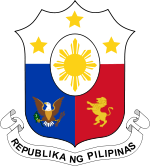- Coco Levy Fund Scam
-
Philippines 
This article is part of the series:
Politics and government of
the PhilippinesLegislature- Congress (15th Congress)
- Senate
- House of Representatives
- Speaker
- Legislative districts
- Sectoral representation
ExecutiveJudiciaryRelated topics
Other countries · Atlas
Philippine Government Portal
The Coco Levy Fund Scam was a controversy in the 1970s and 80's in the Philippines involving the former President Ferdinand Marcos and his cronies. It is alleged that Marcos, Danding Cojuangco, Juan Ponce Enrile, and others conspired to tax coconut farmers, promising them the development of the coconut industry and a share of the investments, but on the contrary were used for personal profit particularly in the purchase of United Coconut Planters Bank (UCPB) and majority stake in San Miguel Corporation (SMC), to name a few.[1]
The issue has not died today, with coconut farmers fighting for justice against the forced taxation, and a share of the Coco Levy Funds' investments. The Coco Levy Fund is estimated to have ballooned anywhere in the range of P100-150 billion in assets.[2][3]
Contents
Background
The Philippine coconut industry is responsible for 25% of the volume of the agricultural sector, and it is reportedly present in 68 of the 79 provinces of the country. Next to sugar, coconut products is also the leading agricultural export of the Philippines, with 37 products and by-products that were exported to 114 countries. The major exports are crude and refined oil, copra meal, desiccated coconut, activated carbon, and oleo-chemicals.[4] About one-third of the Philippine population depends mainly on coconut production for its livelihood.[5]
The legal beginnings of the levy could be found in the Republic Act 6260, the Coconut Investment Act, of June 19, 1971. The act calls for the creation of a Coconut Investment Fund and a Coconut Investment Company (CIC). The objective of the CIC was to: (a) To fully tap the potential of the coconut planters in order to maximize their production and give them greater responsibility in directing and developing the coconut industry; (b) to accelerate the growth of the coconut industry and other related coconut products from the raw material stage to the semi-finished and finally, the finished product stage; (c) to improve, develop and expand the marketing system; and (d) to ensure stable and better incomes for coconut farmers.[6]
In June 30, 1973, President Marcos created the Philippine Coconut Authority through P.D. 232. The PCA's mandate was to "to promote accelerated growth and development of the coconut and other palm oils industry so that the benefits of such growth shall accrue to the greatest number, and to provide continued leadership and support in the integrated development of the industry." The said decree also consolidated the responsibilities and activities of the Coconut Coordinating Council (CCC), the Philippine Coconut Administration (PHILCOA), and the Philippine Coconut Research Institute (PHILCORIN), under one office.[7]
Aquino Administration
Ramos Administration
Estrada Administration
Current Status
See also
- Ferdinand Marcos
- Danding Cojuangco
- United Coconut Planters Bank
- San Miguel Corporation
External links
Citations
- ^ Panesa, Edmer F.. "Cojuangco loses claim to UCPB block". Manila Bulletin. MB.com.ph. http://www.mb.com.ph/node/50476. Retrieved 2007-12-04.
- ^ Requinta, Elka Krystle R.. "UCPB exec talks on coco levy scam". Varsitarian. The Varsitarian Online. http://www.varsitarian.net/news/ucpb_exec_talks_on_coco_levy_scam. Retrieved 2011-05-16.
- ^ Tubeza, Philip. "PCGG exec doubts coconut levy fund’s recovery". Philippine Daily Inquirer. Inquirer.net. http://newsinfo.inquirer.net/breakingnews/nation/view/20100608-274511/PCGG-exec-doubts-coconut-levy-funds-recovery. Retrieved 2008-06-08.
- ^ Dy, Rolando PhD. "The Philippine Coconut Industry: Performance Issues and Recommendations". Ateneo De Manila University. Scribd.com. http://www.scribd.com/doc/4938753/The-Philippine-Coconut-Industry-Performance-Issues-and-Recommendations. Retrieved 2006-08-01.
- ^ Castro, Manuel. "The Philippine Coconut Industry and the Coconut Levy". Philippine European Solidarity Centre (PESC-KSP). PESC-KSP. http://www.philsol.nl/A00b/CocoLevy-background-jul00.htm.
- ^ "Republic Act 6260, the Coconut Investment Act". Chan Robles Virtual Law Library. Philippine Congress. http://www.chanrobles.com/republicacts/republicactno6260.html. Retrieved 1971-6-19.
- ^ "Presidential Decree No. 232, Creating a Philippine Coconut Authority". The LawPhil Project, Philippine Laws and Jurisprudence Databank. Arellano Law Foundation. http://www.lawphil.net/statutes/presdecs/pd1973/pd_232_1973.html. Retrieved 1973-6-30.
Categories:- History of the Philippines
- Political scandals in the Philippines
- 1986 in the Philippines
- Political corruption
Wikimedia Foundation. 2010.

